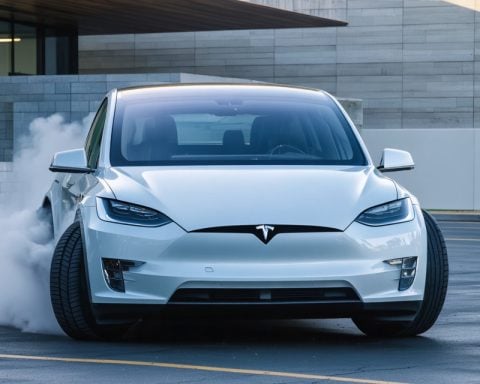Gainesville, Florida, is stepping into the future with an ambitious plan to enhance electric vehicle (EV) charging infrastructure ahead of rising demand. As electric mobility gains traction, city officials are preparing for a significant increase in the number of electric vehicles on the roads.
To accommodate this growth, Gainesville has secured an impressive $11.5 million grant from the U.S. Department of Transportation aimed at expanding their EV charging stations almost twofold. The initiative will see 47 new EV chargers installed at various city and county-owned locations. A spokesperson for the city revealed that the majority of these will feature dual charging capabilities, allowing up to 94 electric vehicles to charge simultaneously.
The strategic placement of these chargers will include city hall, numerous municipal parks, community centers, and collaborative sites with Alachua County and Gainesville Regional Utilities. Presently, there are about 2,000 electric and hybrid vehicles registered in Gainesville; however, forecasts predict that number could surge to approximately 29,400 by the year 2030.
The upcoming infrastructure will incorporate both level 2 and level 3 chargers, providing quicker charging options compared to standard home chargers. The city aims to distribute these stations widely, transforming them into easily accessible alternative fueling stations much like traditional gas stations, thus paving the way for an electric vehicle-friendly environment. Officials have pinpointed 17 specific sites across the area for these enhancements.
Gainesville’s Electric Vehicle Initiative: A Green Path to the Future
Gainesville, Florida, is making notable strides in preparing for the electric vehicle (EV) revolution, spurred by a generous $11.5 million grant from the U.S. Department of Transportation. This funding will enable the city to nearly double its EV charging infrastructure, with plans to install 47 new chargers at various strategic locations. This transition not only highlights the city’s commitment to sustainable mobility but also underlines significant implications for the environment, humanity, and the global economy.
As the demand for electric vehicles surges—predicted to escalate from 2,000 registered EVs today to about 29,400 by 2030—Gainesville is proactively enhancing its charging capabilities. A significant portion of the new chargers will feature dual charging systems, accommodating up to 94 vehicles simultaneously. This level of accessibility is vital for promoting the adoption of electric vehicles, making it more convenient for residents to transition away from traditional gasoline-powered cars.
The environmental impact of this initiative is particularly noteworthy. The increased adoption of electric vehicles will result in reduced greenhouse gas emissions and lower air pollution levels, contributing to cleaner air and a healthier urban environment. Electric vehicles have the potential to significantly decrease the reliance on fossil fuels, particularly if charged with renewable energy sources. Gainesville’s initiative aligns with broader goals to combat climate change and promote sustainable practices, signaling a commitment to environmental stewardship.
Humanity stands to benefit from this development beyond just environmental aspects. The transition to electric mobility inherently promotes public health, reducing respiratory and cardiovascular issues linked to vehicle emissions, ultimately leading to healthier communities. Moreover, as more people adopt electric vehicles, the demand for green energy sources may generate new job opportunities in renewable energy sectors, thus fostering economic growth and enhancing social equity.
On an economic level, Gainesville’s expansion of EV infrastructure could stimulate local economies. Increased EV adoption tends to encourage investments in related businesses—such as charging networks, maintenance services, and technology solutions—that can create jobs and invigorate local markets. Furthermore, as electric vehicles become more mainstream, there is an opportunity for innovative startups and businesses to thrive in this evolving sector.
Looking towards the future of humanity, Gainesville’s efforts mirror a larger trend where cities across the globe are increasingly recognizing the urgent need to adapt to sustainable technologies. The groundwork laid by communities like Gainesville serves as a vital blueprint for achieving a resilient, environmentally-conscious future. As urban centers continue to evolve, the integration of EV infrastructures could play a critical role in shaping transportation habits, urban planning, and energy consumption.
In conclusion, Gainesville’s initiative to expand its electric vehicle charging infrastructure is not just a local improvement; it echoes a significant shift towards sustainable living and transportation practices with far-reaching consequences for the environment, public health, economic vitality, and the future resilience of humanity in the face of climate change. As other cities watch and learn from Gainesville’s example, there is hope that similar initiatives will take root around the world, propelling us closer to a sustainable future.
Gainesville’s Electric Vehicle Charging Revolution: What You Need to Know
The Future of Electric Mobility in Gainesville, Florida
As electric vehicles (EVs) become an essential part of modern transportation, Gainesville, Florida, is taking proactive steps to develop a robust EV charging infrastructure. With the aim of accommodating an anticipated boom in EV usage, city officials are implementing a comprehensive strategy supported by significant federal funding.
Grant for Expansion
Gainesville has obtained a substantial $11.5 million grant from the U.S. Department of Transportation. This funding will facilitate the construction of 47 new EV chargers across various city and county-owned locations, nearly doubling the existing infrastructure. Notably, many of these stations will feature dual charging capabilities, enabling up to 94 vehicles to charge concurrently.
Strategic Charging Locations
The thoughtfully selected sites for new chargers include:
– City Hall
– Municipal parks
– Community centers
– Collaborative locations with Alachua County and Gainesville Regional Utilities
Projections for Electric Vehicles
Currently, Gainesville boasts around 2,000 registered electric and hybrid vehicles. However, projections suggest that this number could skyrocket to approximately 29,400 by 2030, indicating a pressing need for expanded charging capabilities.
Types of Chargers
To meet the diverse needs of EV users, the new infrastructure will incorporate both Level 2 and Level 3 charging stations. Level 2 chargers typically take several hours for a full charge, while Level 3 chargers, or DC fast chargers, can significantly reduce charging time, making them essential for long-distance travel and quick top-ups.
Accessibility and Convenience
The strategic placement of EV chargers is intended to transform Gainesville into an electric vehicle-friendly city. These chargers will become as commonplace and accessible as traditional gas stations, enhancing convenience for local drivers and supporting the overall adoption of electric mobility.
Trends and Innovations
Electric vehicle adoption is on the rise nationwide, and cities like Gainesville are leading the charge in infrastructure development. This initiative reflects a broader trend towards green transportation solutions, ensuring that cities can keep pace with changing mobility needs.
Conclusion
Gainesville’s ambitious EV charging infrastructure plan positions it at the forefront of the electric mobility movement. By securing federal funding and strategically placing new chargers, Gainesville is not only preparing for the future but also promoting a sustainable and convenient transportation option for its residents.
For more insights on electric vehicle infrastructure developments, visit Energy.gov.


















